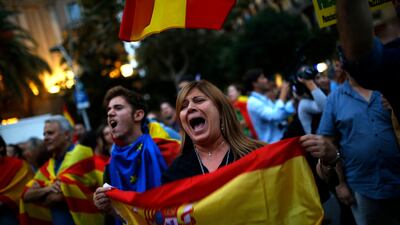Anyone still confused as to why Britain voted to leave the EU need look no further than the commission's inept handling of the Catalan people's attempt to hold an independence referendum.
One of the key issues that, in my view, persuaded millions of Britons to curtail their decades-old affiliation with the EU was their utter contempt for the unelected bureaucrats who run the organisation and who seem to have very little regard for the democratic will of ordinary people.
When the British complained, as they did regularly, about the increasingly invasive diktats that the EU imposed on Britain’s democratically elected parliament, EU officials merely shrugged their shoulders and said it was the price London must pay for having access to the EU’s deeply uncompetitive markets. The result was that the British people decided they had had more than enough of the EU’s meddling and voted to leave.
I would be the first to admit that the Catalan independence issue is very different to the Brexit vote. Catalan resentment at Madrid's insensitive treatment of their concerns dates back at least to the Spanish civil war in the 1930s, when the province became the focal point of the Republican crusade to defeat Nationalist leader Gen Francisco Franco.
___________
Read more
Referendums in Catalonia and Kurdistan turn divisions into crisis
Catalan crisis is reshaping Spain’s political landscape
Bank of England official says Christmas Brexit deadline a must
___________
More recently, Catalans have been alienated by Madrid's roughshod treatment of their concerns, to the extent that momentum has grown for the region to seek independence from Spain, a move that has been bitterly resisted by the authorities in Madrid.
As a consequence, unlike the recent Scottish referendum on independence which was approved by the British government in London, last Sunday's Catalan vote was conducted without Madrid's authorisation.
And it was the fact that from Madrid's point of view, the referendum was technically illegal and unconstitutional that prompted the Spanish authorities to use force to prevent the ballot from taking place, with hundreds of protesters reportedly injured as riot police fired rubber bullets and used extreme violence against unarmed voters.
Irrespective of the constitutional niceties concerning the ballot, few can deny that the response of the Spanish authorities was heavy-handed and has brought shame upon the reputation of the Spanish government, which takes enormous pride in its membership of the EU.
And yet, rather than forcefully condemning Madrid's disgraceful mistreatment of Catalan civilians, what does the EU do? It issues a bland statement in support of Spanish prime minister Mariano Rajoy, saying the referendum was illegal, while making no criticism of the brutality meted out to Catalan voters by civil guard officers. Nor has it made any response to the appeal by Carles Puigdemont, Catalonia's president, for the EU to take an active mediating role in resolving the mounting stand-off between Barcelona, the Catalan capital and Madrid.
If ever a response exposed the moral bankruptcy that lies at the heart of the EU’s political establishment, this is it.
Up to 900 people have been injured, including a woman who claims her fingers were forcibly broken by national police officers as she tried to vote. The over-reaction of the Spanish authorities has resulted in the world witnessing some of the most violent scenes witnessed on the streets of Europe in recent years.
And yet, all the EU can do by way of response is to indulge in ineffectual hand-wringing.
For it is not as though this crisis has come from nowhere. Ever since the Catalan administration indicated it wanted to hold a referendum earlier this year, authorities in Madrid have sanctioned a series of bully-boy measures, such as arresting the more vocal Catalan proponents of the referendum vote and placing them in detention.
So why has EU president Jean-Claude Juncker appeared so determined to turn a blind eye to the appalling and shameful scenes of violence that have been visited upon the streets of Catalonia?
___________
More on separatism from Opinion
Why do secessionist movements rarely gather international support?
Separatism is the most extreme expression of chauvinism
From Kirkuk to Catalonia, referendum votes leave much to be desired for those after autonomy
___________
One explanation lies in the Spanish government’s slavish devotion to the EU cause. Like many European countries for whom democratic government is a relatively new concept, membership of the EU is seen by Madrid as essential to maintaining both its economic and political stability. In return, the EU has contributed handsomely to Spain’s post-Franco economic development.
But another, altogether more troubling, concern lies at the heart of the EU’s muted response to the violence in Catalonia, namely that any attempt by the Catalans to achieve independence would be yet another blow to the EU’s own chances of survival.
The EU has made it clear to the Catalan authorities - as it did to the Scottish government in 2014 - that, if they did achieve their goal of independence, they would be obliged to leave the EU and reapply for membership.
But at a time when the EU is still struggling to come to terms with the implications of Britain's Brexit vote, to have another wealthy European region bidding adios to Brussels would be yet another bitter blow to the EU's own long-term chances of survival.
This is the real explanation for the EU’s failure to hold Madrid to account for its unacceptable behaviour, a policy I fear could ultimately backfire on Brussels.
The likes of Mr Juncker might be determined to preserve the EU at any cost, but the institution's reputation will not be well-served if its failure to resolve political tensions in Spain results in yet further acts of civil strike on the continent of Europe.
Con Coughlin is the Telegraph’s defence and foreign affairs editor


